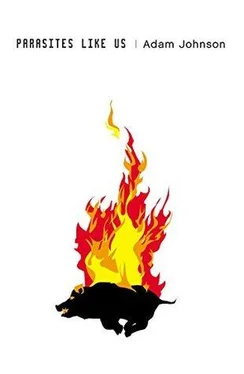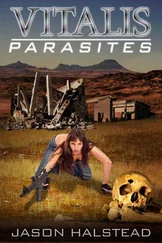When Eggers pulled back the flap of his lodge, he was greeted by a package, wrapped in red paper and tied with yarn, and there was only the faintest smell of fire smoke. Of the gift, probably left by one of his female students, Eggers seemed to take no notice; instead, after the flap closed behind him, I heard him breathing on the fire, a patient, well-paced stoking that made me look away, as if this was a private moment between man and flame. Low clouds had again passed over the river, and of the Clark Bridge, only the upper trestle was visible.
Eggers emerged with a soft leather cloth that looked exactly like a chamois you’d use when washing a car. “This Clovis point is the cover of the Rolling Stone ,” Eggers said, handing it to me. “This is a feature article in Archeology Today. ”
Through the leather cloth, I felt the weight and shape of the stone. You never forget the feel of a Clovis point. A hint of pink was peeking from under the cloth.
“You know, I’ve never found an exotic one,” I told Eggers. “In all my years of hunting. I’ve found some things, don’t get me wrong, but never a colored Clovis point.”
“Well, this one’s yours,” Eggers said.
I unfolded the cloth, and there it was. About five inches long, broad-headed, and cut from the rarest of materials, a semi-translucent rose quartz. Twelve thousand years ago, this artifact was the height of technology on the face of the earth, and no one in the millennia since has been able to reproduce the Clovis’ lost craft. The afternoons I spent flaking flint in my office were merely exercises in humility, for the Clovis concerned themselves with nothing but producing the most dangerous weapons on earth. They left behind no art, no monuments, no shelters, few remains.
I ran my fingers down the dimpled spine of Eggers’ pink point — the cutting edge was covered with serrated ridges that fanned forward to cause severe micro-hemorrhaging on penetration, while at the same time the plane of the blade was fluted with a ridge leading backward, serving as a channel to runnel the blood from the wound. This blade could snap bison ribs and still slice tomatoes.
Over the course of three centuries — at the end of the Pleistocene epoch, twelve thousand years ago — three amazing things happened: the Ice Age ended completely, and glaciers retreated from North America; humans entered the hemisphere, and these Paleo-Indians we call Clovis quickly spread across all forty-eight contiguous states, founding an empire that included Mexico and Canada before their culture came to an end; and, finally, thirty-five species of large North American mammals became extinct. All in three hundred years.
Mammoth and mastodon skeletons have been found with dozens of Clovis points lodged in their bones. Many paleoanthropologists agree that the Clovis people eradicated the elephants of North America, though they tend to believe the other large animals were killed off by climate change.
It was my lone hypothesis, however, articulated in The Depletionists , that the Clovis blade was the demise of the North American camel, the giant sloth, the short-faced bear, and thirty-two other large mammals. And here was the very spear point that had done it. I marveled at its color, held it to the light, and saw that the quartz was clear at the surface with a cataract of milky pink veined through the center. Only a few thousand Clovis points had ever been discovered, and they were all logged in the National Clovis Bank. Fewer still of these super-bleeder spear points were cut from the exotic minerals only Clovis had a fondness for: smoky purple obsidian and ferrous chert, from feldspar, perlite, spider flint, or the blue-yellow of anthracite. And here was rose quartz. In the back alleys of anthropology, there was a black market for these points, and what I held was worth more than my Corvette and custom van put together.
“Okay,” I asked Eggers, “where’d you really get this?”
“I told you,” he said. “I found it.”
An anger rose in me. “You found this and then removed it from the site? This point doesn’t mean anything without context. Haven’t I taught you anything? Unless it’s in situ , where we can see its role in the bigger story, it’s just a bauble.”
“It’s more complicated than that,” Eggers said. Students were filing out of Gufstason Hall, and his eyes followed their brightly colored jackets as they descended the slushy stairwell, arms out for balance, in baby steps. I looked at my wristwatch. It was just after noon, and my father would be waiting for me.
“I’ve got to teach my Arc-Intro,” Eggers added. “There’s more than this spear point. I’ll show you, but I need to ask a favor first.”
Doing a favor for Eggers was no easy thing. He didn’t use money, ride in cars, or borrow music. He didn’t need my fishing pole or want a letter of recommendation. He’d been an unexceptional kid as far as I could tell, one who sat at the back of my classes, dressed like a golf caddy, and probably smoked some reefer. Then he embarked on this project, and somehow he’d become a lean, clear-eyed young man who had no need for anything from you but time, muscle, and wisdom.
“All right, what is it?”
“Meet me here tonight, when the moon is high.”
“Surely, you’re joking,” I told him. “What time is that? Midnight?”
“Midnight sounds right, though I’d have to check the moon.”
“Midnight’s my personal/leisure time.”
“And bring Trudy,” he said. His big, shaggy figure was already heading off to teach.
I stood there a moment with the pink Clovis point in my hand. It felt wrong simply to stick it in my coat pocket as if it was a pen or a throat lozenge, and it seemed more criminal to wander the campus wielding it in my hand. I probably shouldn’t admit this, but my first, brief impulse was to show Janis, to walk up the hill to the plaque that I tried to think of as her, and tell her all about it.
I admit this because these events happened long ago, and it’s more than ironic that a man who spent his career trying to bring the past to life would, around the age of thirty-nine, begin to communicate certain things to the dead.
That’s when Eggers came walking back to me. I was still standing there, hand extended with a pink spear point, looking toward the river so as not to look toward my stepmother. As Eggers neared, I for some reason felt that when he came close he would keep coming closer and give me a pat on the back or clasp my hand. He might hug me, I thought.
Instead, Eggers said, “Are you okay, Dr. Hannah?”
“What?” I asked.
“I better hold this for now,” he said, taking the point from my hand. “I’ll give it back later tonight. And get some rest, yeah?”
Then he walked away again.
* * *
I set off through the quad, following the snowed-in cardio-track, with its frozen fitness stations, then tromped past the Carney Aquatic Center, standing like a cube of jade with its steamed-up walls of Depression-era glass. I could make out the silhouettes of dive platforms, could almost smell the endless drizzle of mildewy rain that dripped from the glass ceiling inside.
There was no getting around the fact that I would be late for lunch with my father downtown, but still I cut through the dean’s courtyard and the president’s garden — the ground winterized with rows of burlap — and it struck me as I passed among the stark colonnades surrounding Old Main that the school paper was right: all the squirrels had disappeared.
The campus opened onto Parkton Square, a one-block park surrounded by multi-story brick buildings erected by people who believed towns like Parkton and Sioux Falls would one day be Kansas Cities and St. Louises. Parking was free during Glacier Days, so I walked past green-hooded meters in front of businesses that were mostly alive, though the Bijou Theater was now an indoor shooting range and the Independent Order of Odd Fellows lodge had been divided into the small apartments where my father now lived. If I looked up to the hill above downtown, I could see the library and buildings of Parkton College, the long-bankrupt Catholic school that was now home to the minimum-security federal prison camp.
Читать дальше












